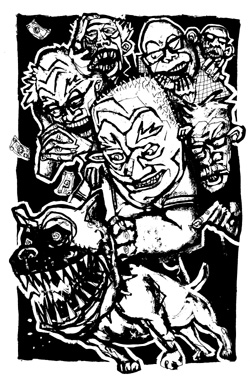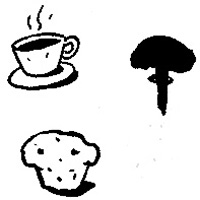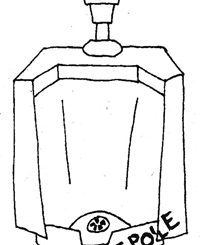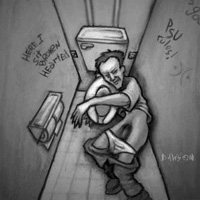 Down on the Farm
Down on the Farm
Part III
by Todd Brendan Fahey
illustration by Mark Reusch
Marnie kissed me on the cheek and moved closer.
Jean Laroue shut his eyes, grabbed hold of the microphone stand, and tipped it off balance, pressing his stiff, gray-flecked goatee against the wire mesh. “When the 41st Army Cavalry picked up the arrows the next morning, they said the ground looked like clay / I awaken in red each night, slick with the fluids of George Custer / I know the cry of the seductress, how puissant the ride into battle / Before the arrows fly…”
When he had finished, the audience reacted with a fairly even quotient of jeering and partisan applause. Marnie nudged me, then stood up. A circle of largely young, female admirers surrounded the strange man they called “Black Jack,” but Marnie bulled her way through.”
Jackie?” she said, adopting a curious fawning tone, “this is the journalist I was telling you about. He’ll understand.”
Laroue stepped forward, sliding the Ray-Bans down on his long, pitted nose. “He’ll be the only one,” he said. Then he let out a laugh that sounded like coarse-grain sandpaper against a steel door. “You know how to swim, don’t you?”
“Sure,” I nodded.
“You’ll need to. Now, let’s fuck off,” he said, snapping his fingers loudly. A small group of older men rose from separate tables, and followed close behind me until we reached a cluster of all-terrain vehicles in the crowded lot. “You’ll ride with me,” Laroue said, unlocking the driver’s door of a mustard Range Rover. The other men squeezed into two trucks.
Laroue drove silently for several minutes, then began fumbling with a stack of CDs that lay in the space between the two front seats. He finally decided on Bitches Brew, which he played at the volume at which Miles probably thought it was intended. Then he pulled a huge joint from the ashtray. He toked on it several times before cutting the headlights on the Rover, and I saw in the darkness that he was passing it to me. “You say no, you walk home. That’s the one moral imperative this evening.”
I took the spliff from his fingers and dragged deeply. Miles would have had it this way, as well. In fact, the two would probably have gotten along famously. Or they would have killed each other. What I did know, suddenly, as the cannabis indica released my innate ability to read another’s DNA chain, was that I was sharing a doobie with the human equivalent of Semtex. And if I lived until morning, I knew I would deliver a black pearl for Salt Lake City magazine.
Ten minutes after leaving the Bar-J, Laroue pulled the Rover nearly to the bank of the Red River. He reached into the glove compartment and took out a plastic sign that read “Police Auxiliary – Do Not Ticket or Tow,” placing it plainly on the dashboard. Before leaving the vehicle, he took off his fur and draped it gently over the front seat, slid a Club theft-disabler through the steering wheel and, after one last drag, flicked the joint into the river.
There was no moon out this night, but through the ecliptic blackness I could see the outline of a pontoon rolling on the water. Laroue stood on the cliff and waved what I counted to be six men past a tree and down a steep embankment.
“You’re next,” he said to me. “Keep most of your weight on your back leg. You want to slide, not tumble.”
And slid I did – most of the way down, in fact. I couldn’t see a fucking thing, and even if I could have, with 20-20 infrared night goggles, my equilibrium was so disrupted by the high-grade marijuana that it would hardly have mattered. I wiped the dirt from my pants and joined the other men on a tall, inflated raft built for a dozen. They muttered vague hellos but otherwise paid no attention to me. Laroue was the last onto the raft, and he basically swam to it, after untying the Kevlar rope that held it moored to a weathered jack pine.
Two of the older men steered the motorless vessel by stabbing a pair of long poles occasionally at some unruly brush-piles along the river; but mostly the flotilla moved effortlessly with the lazy current. From the general conversation – which ran of “odds” and the “heavy favorite” whom they unanimously agreed to be a creature named Buster – and by the level of their enthusiasm, I gathered that a fight was being staged upon our arrival at Laroue’s ranch, and I began to shudder violently. I would be forced to bear witness to some animal form being cannibalized this night, and the thought of it filled me with horror.
A brilliant, azure bug-zapper in the near distance told the men to steer forcefully toward the river’s edge. Laroue jumped off first and tied the raft to a thick metal post. I followed him up a steep set of hand-laid wooden stairs, the aged sextet following close behind. The pungent odor of ripe sinsemilla pods hung heavy in the still night air, and I had a sense that peace was an unknown caller to this hidden grange.
After we had scaled the hill, Jack Laroue swung open his unlocked front door and waved us all inside. I had been to Barry Goldwater’s mountain estate once while living in Phoenix, but Laroue’s cache of Indian art made the Senator’s fabled collection look ridiculous. What stood out most conspicuously amongst the shelves of kachinas and storyteller dolls, the painted earthen pots, the wallsful of ancient arrows and weapons of death, were what appeared to be a corpus of genuine headdresses of all shades and dimensions, hanging on a bare wall, apparently in order of tribal rank; it looked as if he had procured a complete set. I had never seen such an exhibit, not even in Arizona’s Heard Museum. I started to make a friendly inquiry, but the other guests had business on their minds.
“Well, goddammit, let’s quit standin’ around,” griped one codger. “I gotta get back before they find out I’m gone.” The others nodded in assent.
Laroue looked into the air for a long moment before his face split open in a fiendish grin. “If Buster actually loses tonight, I’ll return five-hundred-to-one odds. Anyone feel brave?”
I looked around at floor-level, praying that Buster was never allowed to roam free. By the anxious silence of the six old men, I suspected the beast to be the result of some expensive genetic engineering effort between, say, Biotech International, IBM, and the Church of Scientology, to produce a perfect cross between a pterodactyl and the next villain in Rocky VI.
Finally, one of the men spoke up. “I got a fifty says Buster’ll have to go more than a minute.”
Laroue giggled. “Why don’t you all swim back. I have work to do.”
After more whispering and discontent, one man finally emerged with a wager. “For twenty percent of your operation, Buster goes over three minutes. And cripplin’ don’t count.”
“And what do you bumpkins have to put up?” Laroue scoffed.
The men huddled until once again the spokesman emerged. “I’ll retire as Jackson’s sheriff at the end of this term. And I’ll guarantee your election.”
For a few seconds, Laroue looked dazed, his eyes hollow and distant. When he recovered, his face took on a new quality, one that I could not readily identify. “Three minutes, thirty seconds, and you have yourselves a spectacle.”
The men all shook on it. Laroue turned to me as I stood anchored to the living room floor. “Marlene said you would surely understand,” he mocked, then he turned his back on me and walked with the others through the door to a screen patio. Within seconds, I heard the whimpering and yelping of lonely dogs.
Years of therapy will be required for me to understand exactly why I followed Laroue across that patio and into the backyard. I suppose hearing the agonizing echoes of the carnage would have been, to my mind, more ghastly than seeing for myself that the prey had been able to fight back. But I did follow Laroue, and what I saw, the sheer ghoulishness of the production, will be with me as long as I am alive.
Once I had stepped outside, I was immediately struck by the centerpiece of Laroue’s estate, a squat pyramid of pallid white skulls piled up against a chain link fence at the rear of the yard. The mound must have counted in the low hundreds. I could not recall ever before seeing bleached canine crania, and I felt no attachment to their departed owners, only a dull hatred for the six senior citizens who were kicking and poking at a growling dog in its wire cage; for Laroue, I had no emotion and it was by lacking such a familiarity that I knew I was human.
I watched as Jean Laroue, wearing steel gloves, calmly slid open the door to Buster’s cage, releasing a thick-set, brickle-brown pitbull that ambled out just as surely, scarcely a tremor in its supple musculature. Laroue slid his hand over the dog’s flat skull and called out for the other dog to be pitted. The shortest and stoutest of the six men had apparently done this work before. As another man lifted the cage door, he gripped a spotted white brute by the collar as it leapt from the cage. Both dogs began snarling, uncontrolled spittle dropping to the ground from the loose black flesh of their lower jaws.
The four savages came together in the only section of the yard devoid of grass. I set the timer on my cheap Casio as the five onlookers started hooting behind the doomed dog’s cage, and when I finally looked down through considerable pools of brine, I could see that Buster had taken four minutes and twenty-one seconds to slaughter his rival. During those minutes, he had first punctured the dog’s right eyeball, which dangled hideously for a good thirty seconds before Buster succeeded in tearing it out of the socket. He had then embarked upon a strategy of ruining the loser’s rear haunches by literally breaking the femurs in his jaws. But Buster was not quite fast enough to get behind his foe, and in his relative lethargy lost an ear and a goodly chunk of his scalp to the other dog’s razoring bite.
Everyone agreed that the pain had spurred Buster on to realize his objective: which, simply, was to leave his adversary crawling with the use of only its forelegs, death following quickly by evisceration through the belly wall. But the time it took to do so concerned Laroue, who, after caging Buster again, shook hands with the six men and walked with them through a gate in the fence to where a truck sat. I was not in that truck when it drove away through the unproven scrub that enveloped this wilderness hideout. Our match would be fought inside.
After locking the gate again, Laroue knelt down and took the butchered carcass into his hands. “I’ve always said a fight should be stopped with a clear lead,” he said, shaking his head, his shaggy mane fluttering in the warm, midnight breeze. “But everyone wants to see a mutilation. Is that wrong?” he asked me, but I offered no reply. “I could have rehabilitated this dog. Sold him off as a factory guard.” He walked over to a metal vat near the pyramid of skulls and dumped the body into a solution of caustic acids that would strip the bones clean before daylight.
To be continued…
Please visit the award-winning Far Gone Books/Wisdom’s Maw site: http://www.fargonebooks.com



